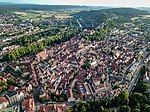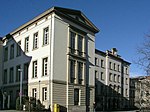Tübinger Stift

The Tübinger Stift (German: [ˈtyːbɪŋɐ ˈʃtɪft] (listen)) is a hall of residence and teaching; it is owned and supported by the Evangelical-Lutheran Church in Württemberg, and located in the university city of Tübingen, in South West Germany. The Stift was founded as an Augustinian monastery in the Middle Ages. After the Reformation, in 1536, Duke Ulrich turned the Stift into a seminary which served to prepare Protestant pastors for Württemberg. To this day the scholarship is still given to students in preparation for the ministry or teaching in Baden-Württemberg. Students receive a scholarship which consists of boarding, lodging and further academic support. Some of the well known "Stiftlers" are the astronomer Johannes Kepler and his associate, statesman Hans Ulrich von Eggenberg, the poet Friedrich Hölderlin who had as roommates the philosophers G. W. F. Hegel and Friedrich Schelling (although the latter was five years their junior), the theologians David Friedrich Strauß, Johann Albrecht Bengel, Friedrich Christoph Oetinger, Ferdinand Christian Baur and Eberhard Nestle, and the philologist August Pauly.
Excerpt from the Wikipedia article Tübinger Stift (License: CC BY-SA 3.0, Authors, Images).Tübinger Stift
Klosterberg,
Geographical coordinates (GPS) Address Nearby Places Show on map
Geographical coordinates (GPS)
| Latitude | Longitude |
|---|---|
| N 48.519444444444 ° | E 9.0533333333333 ° |
Address
Klosterberg 2
72070 , Universität
Baden-Württemberg, Germany
Open on Google Maps










